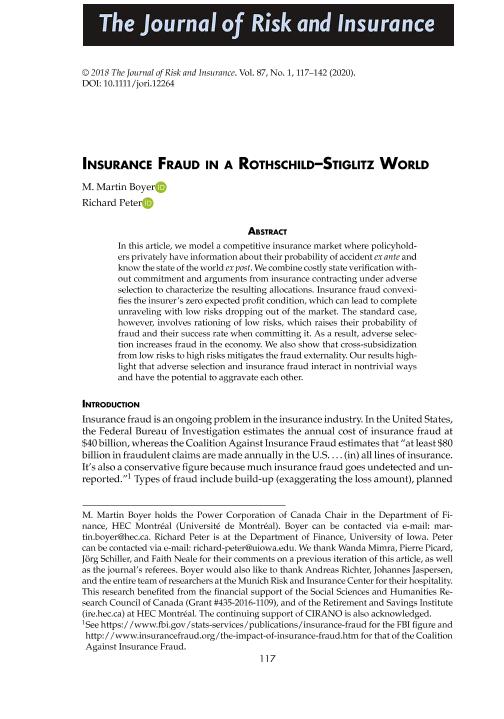Insurance fraud in a Rothschild-Stiglitz world

Contenido multimedia no disponible por derechos de autor o por acceso restringido. Contacte con la institución para más información.
| Tag | 1 | 2 | Value |
|---|---|---|---|
| LDR | 00000cab a2200000 4500 | ||
| 001 | MAP20200009337 | ||
| 003 | MAP | ||
| 005 | 20220823212501.0 | ||
| 008 | 200323e20200302usa|||p |0|||b|eng d | ||
| 040 | $aMAP$bspa$dMAP | ||
| 084 | $a214 | ||
| 100 | $0MAPA20080648343$aMartin Boyer, M. | ||
| 245 | 1 | 0 | $aInsurance fraud in a Rothschild-Stiglitz world$cM. Martin Boyer, Richard Peter |
| 520 | $aIn this article, we model a competitive insurance market where policyholders privately have information about their probability of accident ex ante and know the state of the world ex post.We combine costly state verification without commitment and arguments from insurance contracting under adverse selection to characterize the resulting allocations. Insurance fraud convexifies the insurer's zero expected profit condition, which can lead to complete unraveling with low risks dropping out of the market. The standard case, however, involves rationing of low risks, which raises their probability of fraud and their success rate when committing it. As a result, adverse selection increases fraud in the economy. We also show that cross-subsidization from low risks to high risks mitigates the fraud externality. Our results highlight that adverse selection and insurance fraud interact in nontrivial ways and have the potential to aggravate each other | ||
| 650 | 4 | $0MAPA20080591052$aFraude en el seguro | |
| 650 | 4 | $0MAPA20080586294$aMercado de seguros | |
| 650 | 4 | $0MAPA20190001342$aAdministración de la empresa de seguros | |
| 650 | 4 | $0MAPA20080592042$aModelos matemáticos | |
| 650 | 4 | $0MAPA20080579258$aCálculo actuarial | |
| 650 | $0MAPA20080541064$aFraude | ||
| 700 | $0MAPA20160007701$aPeter, Richard | ||
| 773 | 0 | $wMAP20077000727$tThe Journal of risk and insurance$dNueva York : The American Risk and Insurance Association, 1964-$x0022-4367$g02/03/2020 Volumen 87 Número 1 - marzo 2020 , p. 117-142 |

